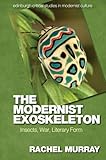The Modernist Exoskeleton : Insects, War, Literary Form / Rachel Murray.
Material type: TextSeries: Edinburgh Critical Studies in Modernist Culture : ECCSMCPublisher: Edinburgh : Edinburgh University Press, [2022]Copyright date: ©2020Description: 1 online resource (224 p.) : 14 B/W illustrationsContent type:
TextSeries: Edinburgh Critical Studies in Modernist Culture : ECCSMCPublisher: Edinburgh : Edinburgh University Press, [2022]Copyright date: ©2020Description: 1 online resource (224 p.) : 14 B/W illustrationsContent type: - 9781474458191
- 9781474458214
- 820.936 23
- online - DeGruyter
| Item type | Current library | Call number | URL | Status | Notes | Barcode | |
|---|---|---|---|---|---|---|---|
 eBook
eBook
|
Biblioteca "Angelicum" Pont. Univ. S.Tommaso d'Aquino Nuvola online | online - DeGruyter (Browse shelf(Opens below)) | Online access | Not for loan (Accesso limitato) | Accesso per gli utenti autorizzati / Access for authorized users | (dgr)9781474458214 |
Frontmatter -- CONTENTS -- FIGURES -- ACKNOWLEDGEMENTS -- SERIES EDITORS’ PREFACE -- ABBREVIATIONS -- INTRODUCTION -- 1 SHELL BURSTS: WYNDHAM LEWIS -- 2 FORMICATION: D. H. LAWRENCE -- 3 COCOON STATES: H.D. -- 4 LARVAL FORMS: SAMUEL BECKETT -- CONCLUSION: ‘THINGS THAT WON’T QUITE FORMULATE' -- BIBLIOGRAPHY -- INDEX
restricted access online access with authorization star
http://purl.org/coar/access_right/c_16ec
Argues for the importance of insects to modernism’s formal innovationsUses the idea of the insect as a key to modernist writers’ engagement with questions of politics, psychology, life, and literary formProvides in-depth analysis of lesser-known modernist narratives, such as H.D.’s Asphodel and Lewis’s Snooty Baronet, as well as new readings of canonical texts – including D. H. Lawrence’s Lady Chatterley’s Lover and Samuel Beckett’s TrilogyExplores the influence of popular scientific writing on modernist aestheticsReveals the attentiveness of modernist writers to nonhuman life, thus forging new lines of connection between modernism and literary animal studiesFocusing on the writing of Wyndham Lewis, D. H. Lawrence, H.D. and Samuel Beckett, this book uncovers a shared fascination with the aesthetic possibilities of the insect body – its adaptive powers, distinct stages of growth and swarming formations. Through a series of close readings, it proposes that the figure of the exoskeleton, which functions both as a protective outer layer and as a site of encounter, can enhance our understanding of modernism’s engagement with nonhuman life, as well as its questioning of the boundaries of the human.
Mode of access: Internet via World Wide Web.
In English.
Description based on online resource; title from PDF title page (publisher's Web site, viewed 27. Jan 2023)


